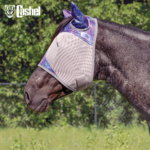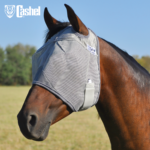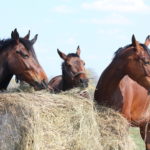A horse with little or no ground manners presents a set of challenges that may at first seem insurmountable, but can often be resolved. These horses are always in your space and may push you around. Often times you end up wondering who is leading whom.

While there are obvious problems with this type of behavior, there are some underlying issues that can make training more difficult as well. For example, a horse with few ground manners tends to have little respect for human commands at all.
Remember that a horse is a herd animal and thus they learn to respect the herd leader (that needs to be you). When they are pushing you around on the ground, they are showing that they do not view you as an authority figure and therefore have little respect for your requests. Conversely, when a horse respects you on the ground (aka views you as the dominant entity in the ?herd?) then he is more likely to accept your guidance once you are on his back.
There are multiple ways to accomplish this respect relationship on the ground, and again no one technique is better than another. You will have to evaluate the willingness of the horse to submit to you and somewhat alter your techniques based on your personality type. For example, a naturally bold, aggressive person will have less trouble conveying their leadership role to a young horse. It tends to be in their body language; the way they walk, they way they approach the horse, their eye contact etc.
However; someone who is naturally more timid and shy may have a bit harder time gaining a horses respect. Knowing that horses respond as prey animals, these more timid people need to think more like a predator. Now obviously I don’t mean come at the young horse with fake claws and fangs and growl at him. I just mean move with assertion around a young horse. Make sure you let them know, through your body language and discipline techniques, that YOU are the boss; not them. While you are working on this you should notice that this will also bring about a bond between you and the animal that will add to your success. Most animals bond to those they respect and want to please them rather than simply reacting to positive or negative reinforcement.
The other main component to establishing good ground manners is in your consistency. Remember, pretty much anything young (kids, horses, dogs, etc) learn by repetition. What is wrong today needs to be equally as wrong tomorrow and the next day. Once you have spent some time teaching the animal the ?rules,? the consequences for breaking those rules should be increasingly uncomfortable. What I mean by this is that when you first start to teach a horse something, obviously you have to show the animal that the behavior is either not acceptable or expected. Once that has been established however, you should not have to ask for this reaction repeatedly.
Let me illustrate with an example. Let?s say you are teaching a green horse to back by pulling on the lead-line towards their chest. Initially, you will have to pull back on the line relatively hard and maybe even put pressure on the chest itself. You are essentially ?showing? the horse that he is expected to move backwards. Once you have repeated this several times and the horse understands what is expected of him, you should not have to pull on the line nearly as hard or multiple times before you get a response. Once the skill is learned you need to expect the animal to respond the FIRST time you ask. After the first request, increase the consequence for not responding (in this example, short jerk on the line, tap on the chest with a crop etc.).
Once you gain the animal?s respect and form that leader/herd-mate bond with him, he will be more pleasant to work with; not to mention safer to be around. He will understand that you are not asking him to entertain the possibility of heading your request; but rather, that you expect him to respond the way you taught him. He will also understand that you are his superior; something necessary in the animal kingdom. He will be more willing to bond with you out of reverence, leading him to trust you. Because you have fought the ?dominance war? while still on the ground (and won I hope) you should not have to fight it again once you are in the saddle; thus making those first few rides much more productive.
A little assertiveness, consistency and patience goes a long way in making the first ride a positive and successful event.
Find more training tips at the Kentucky Horse Council.






